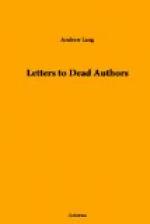Sir,—There are moments when the wheels of life, even of such a life as yours, run slow, and when mistrust and doubt overshadow even the most intrepid disposition. In such a moment, towards the ending of your days, you said to your son, M. Alexandre Dumas, ’I seem to see myself set on a pedestal which trembles as if it were founded on the sands.’ These sands, your uncounted volumes, are all of gold, and make a foundation more solid than the rock. As well might the singer of Odysseus, or the authors of the ‘Arabian Nights’, or the first inventors of the stories of Boccaccio, believe that their works were perishable (their names, indeed, have perished), as the creator of ’Les Trois Mousquetaires’ alarm himself with the thought that the world could ever forget Alexandre Dumas.
Than yours there has been no greater nor more kindly and beneficent force in modern letters. To Scott, indeed, you owed the first impulse of your genius; but, once set in motion, what miracles could it not accomplish? Our dear Porthos was overcome, at last, by a superhuman burden; but your imaginative strength never found a task too great for it. What an extraordinary vigour, what health, what an overflow of force was yours! It is good, in a day of small and laborious ingenuities, to breathe the free air of your books, and dwell in the company of Dumas’s men —so gallant, so frank, so indomitable, such swordsmen, and such trenchermen. Like M. de Rochefort in ’Vingt Ans Apre’s,’ like that prisoner of the Bastille, your genius ’n’est que d’un parti, c’est du parti du grand air.’
There seems to radiate from you a still persistent energy and enjoyment; in that current of strength not only your characters live, frolic, kindly, and sane, but even your very collaborators were animated by the virtue which went out of you. How else can we explain it, the dreary charge which feeble and envious tongues have brought against you, in England and at home? They say you employed in your novels and dramas that vicarious aid which, in the slang of the studio, the ‘sculptor’s ghost’ is fabled to afford.
Well, let it be so; these ghosts, when uninspired by you, were faint and impotent as ‘the strengthless tribes of the dead’ in Homer’s Hades, before Odysseus had poured forth the blood that gave them a momentary valour. It was from you and your inexhaustible vitality that these collaborating spectres drew what life they possessed; and when they parted from you they shuddered back into their nothingness. Where are the plays, where the romances which Maquet and the rest wrote in their own strength? They are forgotten with last year’s snows; they have passed into the wide waste-paper basket of the world. You say of D’Artagnan, when severed from his three friends—from Porthos, Athos, and Aramis—’he felt that he could do nothing, save on the condition that each of these companions yielded to him, if one may so speak, a share of that electric fluid which was his gift from heaven.’




